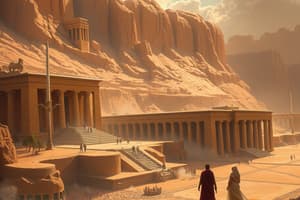Podcast
Questions and Answers
Where were the Maya and Aztec Empires located?
Where were the Maya and Aztec Empires located?
- Maya in the Andes mountain range and Aztec in modern-day Mexico
- Maya in the mountainous highlands and Aztec in the low-lying jungles
- Maya in Costa Rica and Aztec in South America
- Maya in the low-lying jungles and Aztec in the mountainous highlands (correct)
Which empire was located along the Andes mountain range?
Which empire was located along the Andes mountain range?
- Aztec Empire
- Maya Empire
- Costa Rica Empire
- Inca Empire (correct)
Which region does Mesoamerica refer to?
Which region does Mesoamerica refer to?
- Between modern-day Mexico and Costa Rica (correct)
- Between the Maya low-lying jungles and Aztec mountainous highlands
- Between modern-day Mexico and South America
- Between Costa Rica and the Andes mountain range
Which empire did not have contact with either the Maya or the Aztec?
Which empire did not have contact with either the Maya or the Aztec?
Where were the Aztec located within Mesoamerica?
Where were the Aztec located within Mesoamerica?
When did the Maya Empire decline and disappear?
When did the Maya Empire decline and disappear?
Which empire did not travel beyond their region into northern Mesoamerica?
Which empire did not travel beyond their region into northern Mesoamerica?
What agricultural technique did the Aztecs develop to overcome the challenge of growing enough food in Tenochtitlan?
What agricultural technique did the Aztecs develop to overcome the challenge of growing enough food in Tenochtitlan?
What geographic feature made it difficult for the Mayan civilization to unify?
What geographic feature made it difficult for the Mayan civilization to unify?
How did the Inca civilization overcome the reduced flat land for farming in the mountainous region?
How did the Inca civilization overcome the reduced flat land for farming in the mountainous region?
What enabled Tenochtitlan to become a major trading center?
What enabled Tenochtitlan to become a major trading center?
What technological advancements did the Mayans make?
What technological advancements did the Mayans make?
What prevented large unified empires from emerging in Mesoamerica and South America?
What prevented large unified empires from emerging in Mesoamerica and South America?
What did the Inca civilization prosper enough to do despite geographic challenges?
What did the Inca civilization prosper enough to do despite geographic challenges?
What did the unique adaptations to the environment in Mesoamerica and South America enable the Aztec, Mayan, and Inca civilizations to do?
What did the unique adaptations to the environment in Mesoamerica and South America enable the Aztec, Mayan, and Inca civilizations to do?
Flashcards are hidden until you start studying
Study Notes
Geography and Civilizations of Mesoamerica and South America
- Tenochtitlan, the capital of the Aztec empire, was located in a high-altitude valley surrounded by mountains and a lake, providing fertile soil and natural defense.
- Despite strategic benefits, Tenochtitlan's environment made it challenging to grow enough food for the empire, leading to the development of chinampas, a unique agricultural technique using mounds of mud on the lake's edge.
- The adaptation to the environment enabled Tenochtitlan to become a major trading center, attracting 50,000 visitors on market days and funding artists, scholars, and scribes.
- The Mayan civilization in Mesoamerica, based in the southeast on the Yucatan Peninsula, faced difficulties in unifying due to a vast jungle, hindering collective progress but also preventing conquest by others.
- The Mayans made significant advancements in technology, including an advanced understanding of the stars, record-keeping methods, unique language and number systems, and painting their history on public buildings.
- The extreme geography of Mesoamerica prevented large unified empires but allowed diverse languages, techniques, and rich cultures to form.
- The Inca Empire in South America rapidly expanded in a mountainous region and overcame geographic limitations by constructing a road network over a thousand miles long, which still exists today.
- The mountainous region and reduced flat land for farming led the Inca to develop terrace farming, forming mountainsides into large steps with retaining walls to create flat strips of land for cultivation deep into the Andes.
- Despite the geographic challenges, the Inca prospered enough to mine precious metals and create symbolic figurines and ornate objects.
- The geographic differences in Mesoamerica and South America influenced the development of unique agricultural techniques, trade, and technological advancements in the Aztec, Mayan, and Inca civilizations.
- The extreme geography of Mesoamerica and South America enabled diverse languages, techniques, and rich cultures to form, while preventing large unified empires from emerging.
- The unique adaptations to the environment in Mesoamerica and South America allowed the Aztec, Mayan, and Inca civilizations to thrive and make significant contributions to art, technology, and trade.
Studying That Suits You
Use AI to generate personalized quizzes and flashcards to suit your learning preferences.




